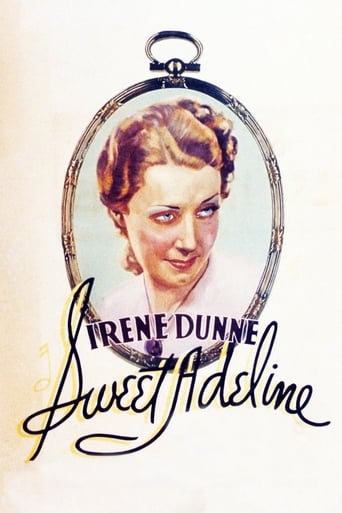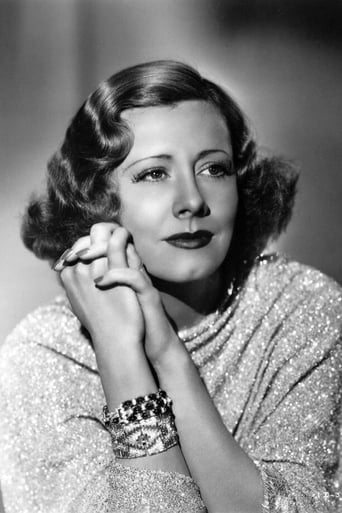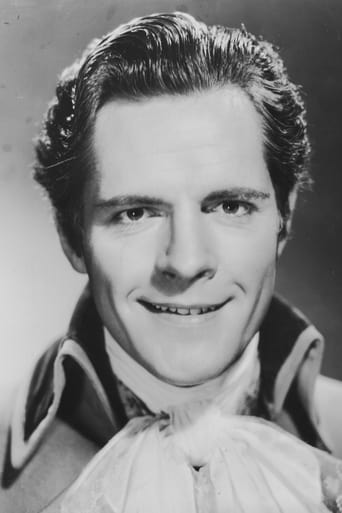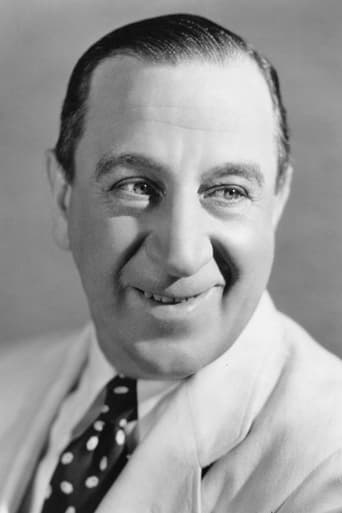

Sweet Adeline (1934)
In 1898, composer Sid Barnett manages to get his sweetheart, Adeline the beer-garden singer, to sing the lead in his new Broadway operetta; this infuriates Elysia, the erstwhile star. But Sid frets as Adeline spends increasing amounts of time with the dashing Major Day.
Watch Trailer
Cast


Reviews
I like the storyline of this show,it attract me so much
Good films always raise compelling questions, whether the format is fiction or documentary fact.
A movie that not only functions as a solid scarefest but a razor-sharp satire.
Great story, amazing characters, superb action, enthralling cinematography. Yes, this is something I am glad I spent money on.
Irene Dunne is "Sweet Adeline," who sings in a beer garden and has aspirations as a professional singer. Her father is opposed to Donald Woods, who write songs, as a suitor. Hugh Herbert plays an eccentric yet likable character (when did he not), who is trying to catch a spy, who is a famous singer. All this sounds admittedly simple-minded, undemanding and corny, but that's why I found it to be refreshing. Hugh Herbert's scenes with Nydia Westman, as Irene's sister, were very natural and were genuinely amusing/funny. Perhaps the highlights of the film are the outstanding songs written by Kern/Hammerstein, sung to perfection by Ms. Dunne. Despite the old feel of this film, I would watch this again, not expecting much except a good, easy-going time with Irene Dunne and company.
Despite a competent cast of players and the Vitaphone Orchestra doing their best to give the music a turn-of-the-century beer garden sound, SWEET ADELINE does nothing to indicate that musicals would find favor with the public in a big way. The old-fashioned Broadway play has been fashioned into an old-fashioned early '30s musical with absolutely no distinction, either in the musical numbers themselves or the lackluster storyline. It's all strictly cornball and very, very hokey.I'll leave a description of the story (which takes place in 1898) to others who have already given a detailed synopsis. Suffice it to say that only the most ardent fans of IRENE DUNNE would be willing to sit through this one patiently enough. She does get a chance to lift her voice in song a few times but the result is, to put it charitably, very modest, nor are the songs anything to cherish.DONALD WOODS, a handsome actor usually confined to supporting roles, is the lead and relies on earnest glances at Dunne to carry his role. It's not enough. Some below par humor is supplied by Hugh Herbert and Ned Sparks.Summing up: Stands alone as one of the least entertaining musicals of the '30s--bad script, dated material and forgettable songs.
SWEET ADELINE (Warner Brothers, 1934), directed by Mervyn LeRoy, released January 1935, continues the cycle of backstage musicals that began successfully with 42nd STREET (1933). Breaking away from the usual Depression-era backdrop, Warners obtained the rights to an earlier stage play starring Helen Morgan, shifted its story to the turn of the century, and acquired the music and lyrics not by the current team of Harry Warren and Al Dubin, but by the more legendary names of Jerome Kern and Oscar Hammerstein. However, in true Hollywood tradition, the screen adaptation strays away from the original adding material of its own.Set during the Spanish-American war, circa 1898, the story, revolves around Adeline (Irene Dunne) a Hoboken barmaid and daughter of Oscar Schmidt (Joseph Cawthorn), a beer garden owner, who wants her to marry Major James Day (Louis Calhern), a man of title and wealth. However, Adeline loves Sid Barnett (Donald Woods), a struggling young composer who hopes to get his music published for an upcoming show for the Love Song Company. Barnett wants Adeline as his leading lady, but because her name isn't relatively known to attract an audience, he is forced to star Elysia (Winifred Shaw), a bad singer who happens to be a espionage spy. After the story shifts from Hoboken to New York City, Elysia, who loses the lead to Adeline, becomes resentful, coming between her and Sid, later making an attempt in having her meets with an "accident" during a performance.The Music and Lyrics by Jerome Kern and Oscar Hammerstein include: "The Polka Dot" (sung by Dorothy Dare); "There'll Be a High Time in the Old Town Tonight" (sung by chorus in background); "Here Am I," "We Were So Young." "Why Was I Born?" (all sung by Irene Dunne); "Oriental Moon" (sung by the unbilled Noah Beery as the Sultan); "Molly O'Donahue" (Sung by Phil Regan); "Lonely Feet" (sung by Irene Dunne); "T'Was So Long Ago" (sung by Joseph Cawthorn, Irene Dunne, Phil Regan, Hugh Herbert and Nydia Westman); "Pretty Little Kitty Lee" (sung by trio); "Lonely Feet" (sung by Dunne/chorus); "We Were So Young" (sung by Regan and Dunne); "Down Where the Wurtzburger Flows" (sung by chorus); "Don't Ever Leave Me" and "Don't Ever Leave Me" (reprize, both sung by Dunne). Of the handful of tunes, only "Lonely Feet" and "We Were So Young" are given the production number treatment as choreographed by Bobby Connolly.A backstage story with limited details of dress rehearsals, it's not precisely an exciting production, but does score points when it comes to nostalgia. Starring the sophisticated Irene Dunne, on loan from RKO Radio, it marked the beginning of her brief career in musical films. The others that followed: ROBERTA (RKO, 1935), benefited from the support of Fred Astaire and Ginger Rogers; while SHOW BOAT (Universal, 1936), succeeds as being the best due to its reputation. A gifted soprano as she was in dramatics and later comedy, Dunne adds dignity to a story much needed of a better script. Donald Woods, who is best as a secondary performer than a leading man, does what is necessary to bring life to his character; Winifred Shaw as the femme fatal, sports an unconvincing accent that's supposed to be Spanish, but sounds more like the French actress Fifi D'Orsay; Louis Calhern as the debonair major who comes between Sid and Adeline, who in turn uses him to make Sid jealous, becomes the show's backer in order to win her over; Nydia Westman supports as best Adeline's friend who's love interest happens to be the befuddled Rupert (Hugh Herbert); the cute and pert Dorothy Dare as a singing female bandleader who appears in the film's opening and closing, having no connection with the story, while Irish tenor Phil Regan vocalizes during the dress rehearsals.SWEET ADELINE amounts itself with some doses of amusement, including some inside humor, ranging from a little boy auditioning who turns out to be that Jolson kid, Al that is, along with reliable character actors Hugh Herbert and Ned Sparks (as the show's director) in their funny moments with their one-liners: Sparks: "See that step. It's a very hard step to do." Herbert: "Why do they do it?" (Sparks' reaction to that answer is priceless. Watch for it). And then there's Herbert's attempt to fool people with his disguises, now that he is Operator 66 for the Department of Justice, and being recognized anyway, does provoke some good laughs as well.SWEET ADELINE, distributed on video cassette around 1992, and currently out of print, formerly shown on Turner Network Television during its early days of broadcasting that began in 1988, can be seen on Turner Classic Movies, especially on December 20th, as a tribute to Irene Dunne's birthday. The movie may not be perfect, but being more like a nostalgic trip down melody lane makes this 87 minute operetta palatable. (***)
Sweet Adeline was presented on the Broadway stage back in 1929 and was primarily a vehicle for Helen Morgan. Morgan had just made a big hit in Kern's greatest musical, Showboat, in the supporting part of Julie LaVerne. She got such raves for that part that a whole show was built around her. I tend to think that she was deep into alcoholism at the time this was done and was not asked to do the film version. Sweet Adeline unfortunately during its run, ran headlong into the Great Depression and had to close.Irene Dunne carries the film version here and does a remarkable job. She was one of the great Hollywood talents of her time with an exquisite soprano voice for films like these and a good sense of comedy for some of the non-musical parts she did. She performs the standards that Morgan introduced on Broadway as good as Morgan did. Sweet Adeline had two big hit numbers Why Was I Born and Don't Ever Leave Me which are two of the best Jerome Kern ever wrote. Otto Harbach wrote the lyrics.Unfortunately and I think that this was because Sweet Adeline was a star vehicle for Helen Morgan when originally done, Ms. Dunne was not given a strong leading man. Donald Woods was a competent actor, with all the charisma of dishwater. His best known part in films was in A Tale of Two Cities where he played Charles Darnay where essentially all he had to do was look handsome and earnest. More was required here and Irene could have used Allan Jones who she did Showboat with or if you wanted a non-singer, Cary Grant, Melvyn Douglas, or Spencer Tracy all of whom she did some classic films with. The rest of the cast was good. Louis Calhern played the villain in the best Snidely Whiplash tradition. His proposition to Irene that he was not interested in marriage to her, just in living together was generations ahead of its time. Ned Sparks and Hugh Herbert perform their usual parts in Warner Brothers musicals and there were some nice turns by Nydia Westman and Joseph Cawthorn as Dunne's sister and father respectively. Mervyn LeRoy did succeed nicely in capturing the old fashioned flavor of life at the turn of the last century. If you're an Irene Dunne fan this is a must.




